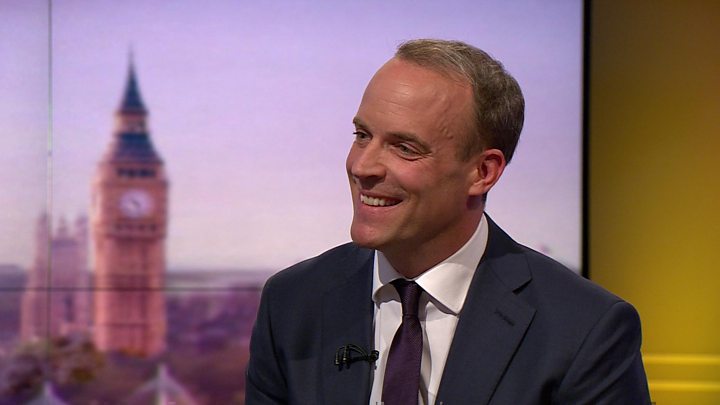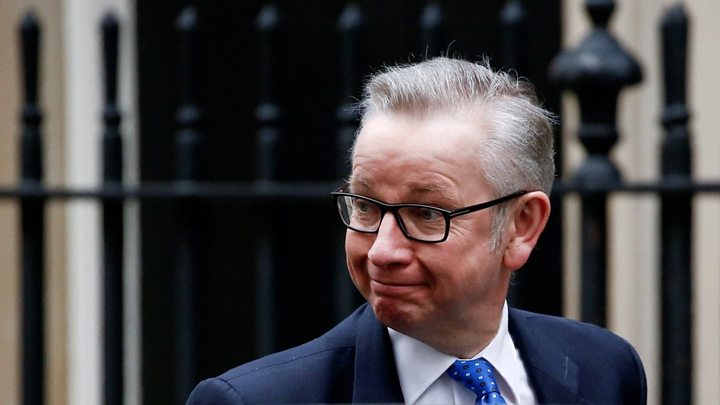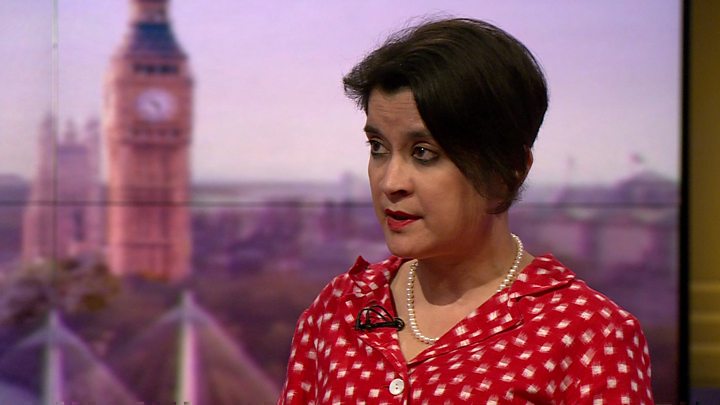Tory leadership: Raab sets out leader bid as Gove joins race

Media playback is unsupported on your device
Dominic Raab has been setting out his pitch to become Conservative leader, as Michael Gove becomes the eighth MP to join the race to succeed Theresa May.
Mr Raab told the BBC he would fight for a “fairer” Brexit deal with the EU – but if that were not possible, the UK would leave with no deal in October.
Mr Gove confirmed he would run to “deliver Brexit” and unite the party.
Chancellor Philip Hammond said it would be a “dangerous strategy” to ignore Parliament, which has opposed no-deal.
On Friday, Mrs May announced she would be standing down as Tory leader on 7 June.
‘Ready to lead’
Mr Gove confirmed he would run for leader, saying: “I believe that I’m ready to unite the Conservative and Unionist Party, ready to deliver Brexit, and ready to lead this great country.” He is expected to outline his pitch later.

Media playback is unsupported on your device
His decision to enter the race echoes the 2016 contest, when he ran against his former Vote Leave ally Boris Johnson for the leadership.
Then, he faced allegations of betrayal after withdrawing support from Mr Johnson and running for leader himself, eventually helping to end both men’s chances of becoming prime minister.
Former Brexit Secretary Dominic Raab and former Commons leader Andrea Leadsom revealed their leadership bids in the Sunday newspapers.
Mr Raab told the BBC’s Andrew Marr Show that the UK’s previous negotiations with the EU over the withdrawal agreement had not been “resolute” enough, and a no-deal Brexit had been taken “off the table”.
“I would fight for a fairer deal in Brussels with negotiations to change the backstop arrangements, and if not I would be clear that we would leave on WTO terms in October.”
He added: “I don’t want a WTO Brexit but I think unless you are willing to keep our promises as politicians… we put ourselves in a much weaker position in terms of getting a deal.”
But Chancellor Philip Hammond said the suggestion that it was possible to renegotiate the withdrawal agreement was a “fig leaf” for “what is actually a policy of leaving on no-deal terms”.
That policy was clearly opposed by Parliament, he told the BBC’s Andrew Marr Show.
“This is a parliamentary democracy. A prime minister who ignores Parliament cannot expect to survive very long,” he warned.
No-deal ‘if necessary’
Ms Leadsom also said she supported a no-deal Brexit “if necessary”, telling the Sunday Times that to succeed in a negotiation “you have to be prepared to walk away”.
And former work and pensions secretary Esther McVey told Sky’s Sophy Ridge on Sunday: “The 31 October is the key date and we are coming out then, and if that means without a deal then that’s what it means.
“We won’t be asking for any more extensions. If Europe wants to come back to us, the door is open if they want a better deal.”
They have joined Foreign Secretary Jeremy Hunt, his predecessor Boris Johnson, International Development Secretary Rory Stewart, and Health Secretary Matt Hancock in the battle for the leadership.
All the contenders have strived to make their position on Brexit clear to their electors – the 313 Tory MPs who choose a shortlist and the 124,000 party members who will have the final say.
In the Sunday Telegraph, party chairman Brandon Lewis said the party membership had swelled by 36,000 in the last year – bringing the total to more than 160,000.
‘A tantalising and fascinating contest’
Michael Gove’s declaration sets up a tantalising and fascinating contest between two of the architects of the Leave campaign, who fell out so spectacularly during the contest to replace David Cameron immediately after the referendum three years ago.
Mr Gove had been supporting Boris Johnson to be prime minister – until he, “reluctantly but firmly” as he put it, concluded he himself should stand and Mr Johnson should stand aside.
This time, the two men will take each other on. But in these opening skirmishes of this campaign, what is emerging as the central fault line is the instincts of the candidates on a no-deal Brexit.
Some are willing to embrace it, others think it would be a disaster. The outlook of the eventual winner could shape our country for years to come.
Some candidates have stressed the need to get a Brexit deal through Parliament.
Mr Hunt told the Sunday Times he had the business experience to secure an agreement. “Doing deals is my bread and butter,” he said.
And in a direct criticism of Boris Johnson, Mr Stewart said: “I would not serve in the cabinet of someone explicitly pushing for a no-deal Brexit.”
Mr Hancock said Mrs May’s successor must be “brutally honest” about the “trade-offs” required to get a deal through Parliament.
‘Back to the people’
Meanwhile, Labour’s deputy leader Tom Watson told the Observer that his party must fully commit to supporting another referendum.
And asked about Labour’s plans, shadow chancellor John McDonnell told Sky that the country faced the prospect of an “extremist Brexiteer” taking over.
“I think the responsibility is on all of those opposition parties to come together with us and some Conservative MPs to block a ‘no deal’, and if that means going back to the people, yes let’s go back to the people,” he said.

Media playback is unsupported on your device
Mrs May will continue as prime minister while the leadership contest takes place.
Tory MPs have until the week beginning 10 June to put their name forward, as long as they have the backing of two parliamentary colleagues.
The candidates will be whittled down by votes of MPs until two remain, and in July a postal ballot of all party members will be held to decide the winner.
The last leader elected by the membership was David Cameron in 2005. Theresa May was unopposed in 2016.





